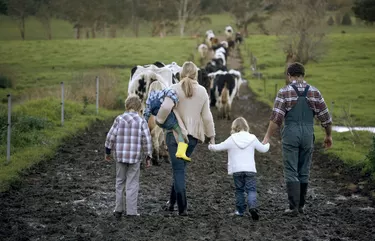
If you earn some income from a hobby farm, you're allowed to deduct farm expenses. You can only deduct hobby farm expenses to the extent you have hobby income. If your farm starts to become profitable, you may need to report it has a business instead of a hobby. Business farms are allowed to deduct expenses in excess of revenues.
Hobby Farms and Business Farms
Video of the Day
Before reporting your farm activities for tax purposes, make sure that your hobby farm is really just a hobby. According to the IRS, the primary difference between a business or a hobby is the intent to earn profit. If your farm hasn't been profitable for three out of the last five years and you're not working to make it profitable, it's a hobby. Otherwise, it's a business.
Video of the Day
Hobby Farm Deductions
Any costs and expenses you have due to your farm activities can be potential hobby expenses. For a hobby farm, this could be the cost of soil, nutrients, fertilizer, equipment, sheds, garden supplies, garden beds, seeds and plants. If you sell products at a farmer's market or to the general public, the cost of advertising or travel to different locations is also considered an expense. Save receipts and documentation to substantiate hobby expenses. One easy way to keep track of hobby purchases is to use a separate credit card for all purchases for your farm.
Reporting Hobby Farm Revenues and Deductions
If your farm is a hobby, report all revenues on Form 1040, line 21, Other Income. You can report hobby farm expenses to offset income on Schedule A. Report total hobby expenses in line 23, Other Expenses. Per the IRS, hobby expenses cannot exceed hobby revenue. If your hobby expenses exceed revenues, cap the amount of expenses you report in line 23 of Schedule A. For example, if you earned $500 from your hobby farm and had $700 in expenses, report $500 of expenses in line 23.
Business Farms
If you determine your hobby farm is actually a business, or it begins to turn a profit over several years, report farm profits and losses on Schedule F. The most significant difference between this and reporting hobby farm income is that your expenses are allowed to exceed your revenues. If this occurs, you'll have a net operating loss that you can apply to reduce your taxable income in future, profitable years. If your business becomes unprofitable for a few years in a row, you may need to switch back to reporting it as a hobby farm.